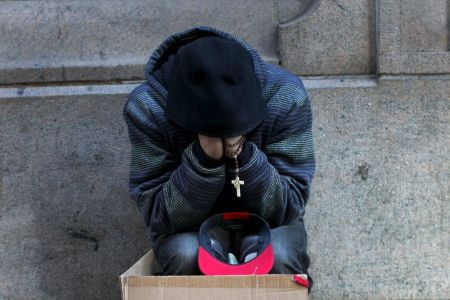'One of the toughest assignments God could ask': SafeHouse Outreach director on helping the homeless

Hundreds of thousands of Americans suffer homelessness, enduring a hard life on cold and dangerous streets. Witnessing this daily hardship is what inspires many Christians to take action by being the hands and feet of Jesus Christ by caring for “the least of these” (Matthew 25:40).
The U.S. Department of Housing and Urban Development said in its 2020 Annual Homeless Assessment Report to Congress that “580,466 people experienced homelessness on a single night in 2020.”
Other organizations have estimated that the displaced population is much higher than HUD’s figures. The National Homelessness Law Center, based in Washington, D.C., estimates that up to 3.5 million Americans are likely to experience homelessness each year.
Among the Christian organizations that serve those who are displaced is SafeHouse Outreach, located in Atlanta, Georgia.
In a Christian Post exclusive, the organization gave a rare behind-the-scenes look into what the life of displacement looks like for the men and women who find themselves on the streets in one of the country’s largest cities.
Joe McCutchen, who’s known as the organization’s problem-solving director, is among those whose daily job is to serve the long line of men and women seeking assistance.
“Philip Bray founded this organization in 1982, and he was a preacher’s kid of a megachurch,” McCutchen told CP. “I always say he took a left turn out of the parsonage and became a drug dealer and a drug user. When he got free, he just started coming to the streets to help people. Phillip passed away a little over a year ago. Now his son, Josh, is the CEO. My role at the organization is, if you have a problem, come on in, let’s see if we can solve it.”
For McCutchen, solving problems is something he feels called to do and counts it a joy to help those who SafeHouse was created to serve. Three of those who’ve benefited from SafeHouse include Jennifer Mohan, Allan Moban and Randhall Thompson. They look at McCuthen as someone who has blessed their lives.
From the moment this reporter entered the center, it became apparent that everyone has a story to share. For many, an additional challenge they’ve had to grapple with has been COVID-19. Walking through the pandemic was unexpected and has brought great suffering and trials to the displaced community.
Thompson has seen the effects of COVID-19 firsthand in the lives of his friends who live on the streets. “I have all of the vaccinations, and I’ve been tested and know of people who have passed away from the virus,” he said. It’s one of the hard realities and among the many challenges faced by people who live on the streets.
Along with Thompson, Moban shared details of the abuse and violence on the streets, as both have been victims of it themselves.
People often attempt to steal possessions, such as blankets, and threaten to cause bodily harm, Moban explained. Sleeping on the streets was something they never thought they’d have to endure.
Having lived on the streets for less than a year, both men have also experienced the loss of familial connections.
Moban, who’s from Rome, Georgia, which is northwest of Atlanta, shared more about his plight and inability to contact his family: “I lost my phone and don’t have a way to get in contact with them.”
Not being able to re-connect with family members and repair strained relationships is a daily concern for many people who seek assistance at SafeHouse. For some, McCutchen becomes a surrogate relative.
“A place like SafeHouse shares love with people and they’re like a family,” said Mohan, who went from being homeless and a victim of prostitution to now having her own apartment. She also advised those who know of someone who’s struggling on the streets to find an organization like SafeHouse that helps bring people out of homelessness and addiction.
McCutchen agreed with Mohan’s assessment, adding that if people want to get involved in the homeless community and help, they should come alongside organizations that already have effective programs and not try to do it on their own.
“As Christians, one of the worst things that Christians do is we keep people in their addictions and we do that by rescuing people, by not letting them ever feel the weight of the problems they’re going through,” he said. “It’s one of the toughest assignments that God could ask someone to do, but you keep showing up every day.”





















